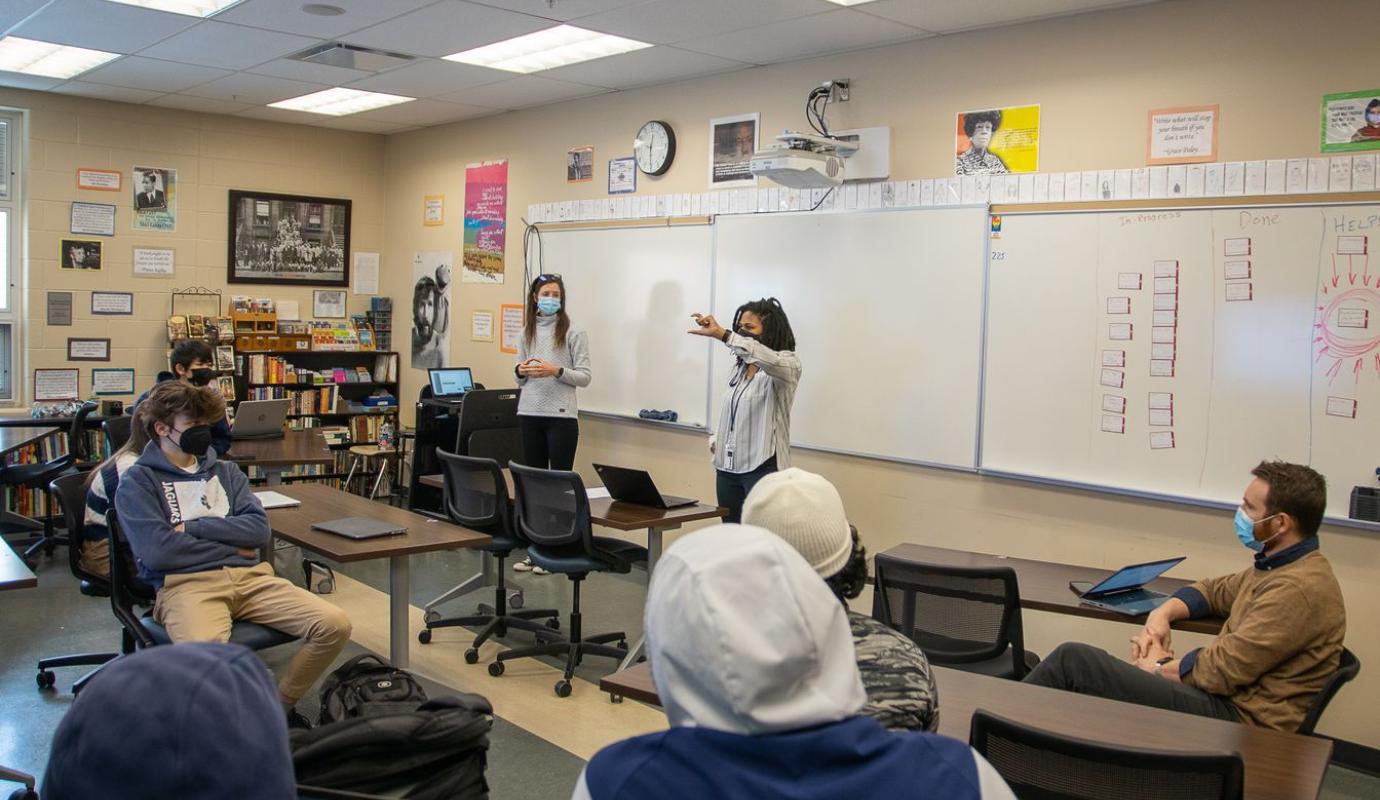Emily Berty and Ivy Anderson
We have been on “the other side of the desk” as college admissions officers. We have read the essays, reviewed the transcripts, sat through committees, and made admissions recommendations. We relished our time as admissions officers, guiding students as they considered our campuses for their post-secondary education. However, admissions officers’ work with students is short-lived. We both craved the opportunity to get to know students on a long-term basis, work through applications and essays with them, and advocate for and celebrate with students in taking their next steps. During admissions travel, Ms. Berty was struck by the candid, supportive, authentic interactions she would often witness between high school students and their school counselors. She recognized it was through this type of relationship-building that she would be able to best guide students in their post-secondary planning. For Ms. Anderson, it was an encounter as an admissions officer with a prospective student whom she interviewed that made her want to go into college counseling. The student was funny, insightful, and thoughtful in her interview, and Ms. Anderson realized she wished she had been able to see this student’s growth and celebrate with her as the college counselor, rather than the admissions officer.
We have decades of experience and knowledge. We have been active leaders within our professional associations at the state, regional, and national levels. However, we’ve entered (and stayed in) this field because we love working with students and their families, and doing our best to demystify this process.
What’s noteworthy about Wellington is that administration and faculty are invested in students’ next steps. Faculty and College Counseling frequently collaborate on programming and curriculum-building in order to best serve students. Students are encouraged to embrace Wellington’s values - to be curious, be themselves, be ambitious, be empathetic, and be responsible - in their college admissions processes in order to identify schools that best fit them as individuals. Wellington’s school culture is one that encourages students to holistically find their fit from academic programming and campus resources to campus culture and even study abroad programs. We chose to join this school community, as guides through what can be a confusing and overwhelming process, because Wellington celebrates students in their choices to wholeheartedly pursue what is best for them.
As students learn more about themselves, their goals, strengths, and potential throughout this process, they are also tasked with mastering another language of sorts - the alphabet soup of acronyms that further complicates an already complex process.
Do I need to take the ACT or SAT?
Should I apply EA, ED or RD to RPI?
Does RISD require the FAFSA and the CSS Profile?
Our scientific research has demonstrated that fluency in the language of college admissions contributes to increased confidence among students and families throughout the application and decision-making processes. With this goal in mind, the college counseling team provides a variety of tools that aim to meet Wellington families where they are along their individual journeys. This means helping them understand the current trends related to standardized testing, including the ACT and SAT, and the test-optional movement; differentiating between Early Action (EA), Early Decision (ED), and Regular Decision (RD); and educating them regarding the financial aid application process that includes the Free Application for Federal Student Aid (FAFSA) and CSS Profile.
The work we do takes many forms. We host evening family gatherings where we have heard directly from experts in the fields of financial aid and selective college admissions. College counseling is built into the LEAP Day schedule for both first-trimester seniors and third-trimester juniors. During our time with the seniors, they engaged in interactive application reviews, mock interviews, and essay workshops. Seniors learned from guest speakers on topics ranging from test-optional admissions to financial aid to campus housing. Perhaps most memorable, they heard from others who speak their native language: Wellington alumni. These familiar faces joined us virtually from throughout the U.S. and abroad and former students candidly shared their stories, successes, and advice. Freshmen and sophomores meet with us in groups each trimester and dip their toes into the post-secondary planning process as they learn about the variety of college/university options and career paths that exist. They are encouraged to start high school with an open and curious mind. This will allow them to discover more about themselves and be best prepared to identify and pursue a post-secondary path that will be the best fit for them down the road. Additionally, we spend much of our days meeting with individual students, guiding them through their college searches, engaging them in self-reflection, assisting them with applications and essays, and eventually celebrating their post-secondary decisions.
As students and families become increasingly fluent in admissions lingo, it is important to know that all questions are welcome and encouraged. The college search, application, and decision making-processes are constantly evolving, and our goal is to walk with students and families as they navigate their unique paths. Every search will be different. Every family enters the process with a different level of fluency. Every year brings a new change, shift, or trend.
The next time you face a curious acronym related to college admissions, just remember: the college counseling team is here to help. Whether your question is about taking the ACT or SAT; applying ED, EA, RD, or even mysterious REA; or differentiating between the FAFSA and CSS Profile, not to mention navigating iDoc - please reach out. We are happy to be your interpreters.
